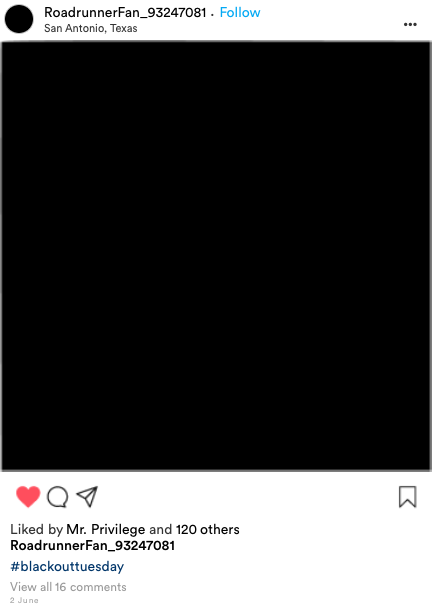Clout-driven activism is not real activism
September 1, 2020
Performative activism is defined as activism done to increase one’s social capital rather than out of devotion to the cause. It is used in a number of ways to support movements such as LGBTQ+ rights, political events, and most notably, the Black Lives Matter movement. Recent incidents of police brutality have been particularly highly-publicized, especially thanks to social media, and as a result, support for BLM has been as high as ever. I remember for about two weeks in June, my social media timeline was filled with nothing but awareness-raising, which is great and should be continued.

Then came #blackouttuesday: many people posted a black square, supposedly to raise awareness for BLM, and felt that was enough activism. Many people posted some examples of activism to not be called racist and to show they care. The number of black squares was more than the number of signatures on any of the petitions for George Floyd, Breonna Taylor, or Ahmaud Arbery.
After that, everything went back to normal, and it seemed like many influencers and celebrities seemed to just forget about everything that happened. Influencers wanted praise and recognition for their performative activism. I remember an Instagram livestream of one influencer recommending different books for her followers; when she was called out for reading none of them, she still wanted praise for recommending them in the first place.
There should not be praise for showing activism. It should be expected that people with these platforms will spread awareness for social issues. Even corporate brands, politicians, and everyday people who were usually silent on these issues spoke up. There is nothing wrong with advocating for things– but there must be more than just saying “we hear you and we are with you” and donating ultimately small portions of money for billion-dollar corporations. There is nothing wrong with being enraged and frustrated with the events going on, but if 2020 was the year you first took notice of it, that is a problem in itself. Showing up to a protest to take pictures that appeal to your aesthetic isn’t the motive or end goal.
There is more to this movement than saying “I’m listening and I’m learning.” That phrase is essentially saying “thoughts and prayers” because it offers no solution to current social issues that BIPOC have dealt with for centuries. The Black Lives Matter movement has been around since 2013 following the murder of Trayvon Martin. It shouldn’t have taken seven years for normal people and influencers to learn about racial injustices. These incidents are not new.
From Rodney King to Michael Garner to Breonna Taylor, police brutality has been an issue for decades. There is more to the movement than just that. It goes deeper than what many people are advocating for such as mass incarceration, the war on drugs, maternal mortality, and BIPOC communities disproportionately impacted by COVID-19. The movement isn’t just about learning, it’s about taking the initiative to support and make the change, to inform while you learn more about ongoing issues whilst changing the state of our society.
Painting #blacklivesmatter on streets and having politicians kneeling only does so much for the cause. Changes come from real activism and real support, not just showing support to make you seem more “woke” or make it seem like you care.
Social media is a great tool to spread awareness, but activism on it shouldn’t solely be to follow a trend. In the words of Alexandria Ocasio-Cortez, “It’s not enough to paint slogans. We need systemic change: ending qualified immunity, changing budget priorities, investing in communities harmed by over-policing, and more. The solutions are out there. We must act on them.”






Kaelin • Sep 1, 2020 at 7:35 pm
This was such a great article. Thank you for taking the time to write an important piece on how 2020 has been. I agree that it’s wrong to just “appear” to be FOR the cause. Be for the cause genuinely.
I am excited to read more articles from the writer.